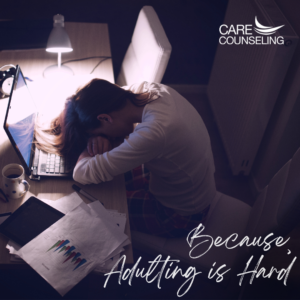Adulting is Hard
 Being an adult is hard work and there are both joys and challenges along the span of development—including transitioning to young adulthood, middle adulthood, and older adulthood.
Being an adult is hard work and there are both joys and challenges along the span of development—including transitioning to young adulthood, middle adulthood, and older adulthood.
I recently had help from someone who asked their co-workers (representing an age span of 20 to 50) the following question: “What makes being an adult so hard?”
Here are some of their responses and the themes that make being an adult hard. If you can relate to any of the following, know that you are not alone!
Too Many Responsibilities
“Having so many responsibilities and no one to help.”
“Responsibilities and having to become independent.”
Loss of Support or Perceived Loss of Support
“Having to depend on yourself to make everything happen…”
Pressure to Succeed/ Make the “Right” Decision
“…Knowing how easy it is to fail and how hard it is to succeed.”
“Knowing that if you make the wrong decision, it impacts so much and knowing you’re steps away from always being behind.”
Parenting Logistics
“Adulthood was pretty simple for me until I had kids. Those things are a logistical nightmare.’
Finding Balance
“Finding the balance in everything-family, friends, work, finances/ budgets.”
Uncertainty and Fear with Unknowns
“Making decisions with so many unknown variables and taking that leap of faith or staying in the comfort zone.”
Coping with Physical or Mental Health Symptoms
“Back pain”
Although the mental health aspects were not mentioned outright, the responses above are common for those experiencing symptoms of anxiety, and depression, and having difficulties adjusting to stressors of adulthood.
Talking to a therapist can help validate your thoughts, feelings, and experiences. Yes, adulthood is hard. Whether you are seeking a nonjudgmental place to process, seeking support for specific goals, addressing unhelpful thinking patterns, or desiring to learn new skills to help ease the pressures of adulthood, CARECounseling understands that “Adulting is Hard.”
Written By: Charlotte Johnson, MA, LPCC

Creating Welcoming Environments: Inclusive Language

Resources for LGBTQIA+ competent care and support

What inclusion looks like

CARE Counseling & University of St. Thomas Athletics: A Partnership Rooted in Mental Wellness and Community

Practicing gratitude meditation

KKBJ Radio Feature “What Does It Mean to Have “Good” Mental Health?”

The relief of an adult ADHD diagnosis

Celebrate and honor pride year-round

5 surprising ways nature can help you heal

How to find a therapist and what to ask

MSP Magazine “Therapy that Fits” News Feature

Could you be struggling with postpartum depression or anxiety?

Yes, Mommy Brain is Real

4 Smart Health Habits for Women

Supporting Women’s Mental Health

What Exactly is Gut Health?

How Nutrients Support You

Increasing Your Vitality Through Nature and Psychology

Learn and Practice DBT Skills to Help You Cope This Holiday Season

How can Therapy Help When I am Feeling Overwhelmed with the Holidays?

5 Reasons Why Affirmations Are Not Working for You

Building Youth Confidence

October is Domestic Violence Awareness Month (DVAM)




